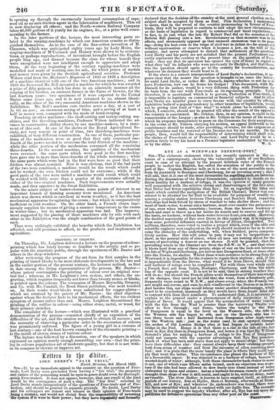RYE AS A WINDWARD DEFENCE - 14MT.!
Sin—The elaborate statement which has recently appeared in the co- lumns of a contemporary, showing the vulnerable points of our Southern coast in case of an attempt by the present delirious ruler of the French people to molest the English, has called the attention of the public to the port of Rye. Captain Maurice tells us it is one of the most accessible spots, from its proximity to Boulogne and Cherbourg, for an invading army ; and I will add, that it is one of the most favourable for repelling such an invasion. During the discussions of the Royal Commission, appointed to decide on the fittest locality for a harbour of refuge, it was the opinion of many persons well acquainted with the relative claims and disadvantages of the two sites, that Dover had fewer capabilities than Rye : for as regarded the tides and winds which control the navigation of the British Channel, Dover was con- sidered to be situated too far East to-be available for purposes of readily re- suming a cruising station between Cherbourg and Beachey Head, supposing that ships had been forced by stress of weather to take shelter there ; and the went of back-water, to scour, outit'harbour, must ever render the permanence of one, even when made, uncertain; 'because, from the known tendency of beach and sand to throw up a bar before its mouth and to 8w:rye and fill up the basin, no harbour, without back-water to scour it out, can exist. However, the decided superiority of Rye over Dover in this respect was, it is supposed, from some powerful influence exerted in favour of Dover, disregarded. Two millions, therefore, were voted to realize a project which, even if the able and scientific engineer now employed on the work should succeed so far as to over- come the obstacles of the undertaking, will, when finished, prove compara- tively useless. How this will come to pass it may not be inopportune to show, in the present state of alarm, when all men are looking about for the means of preventing a descent on our shores. It will be granted, that the prevailing winds in the Channel are from the S.B.W. to W. and that when it blows hard from any of these points, ships of war on the W., between the Isle of Wight and Cherbourg, are driven into Dungeness Road, or more often into the Downs, for shelter. Whilst these winds continue to be strong from the Westward it is impossible for the cruisers to regain their stations ; and, if this is impracticable from the Downs, what would it be from Dover, should that said harbour of refuge ever be completed ? Yet with these very winds could a French fleet _sail from Calais, Boulogne, Cherbourg, and from the whole line of the opposite coast. It is not to be said, that in stormy weather they will do so ; but should the French pilots avail themselves of-their knowledge of its changes, they need not be told that the wind, from a.Southerly gale, frequently veers round to W.N.W., and clears away, when the French ves- sels might sail across, and ours be still windbound in the Downs or in Dover. And besides this, our ships would labour under another disadvantage, which isnot to be overlooked, inasmuch as they would have three hours' later-tide to contend with than their assailants. To understand that,..it is necessary to explain to the general reader a phamothenon of daily occurrence in the Straits of Dover. It would appear that the accumulation of water coming with the tide from the West is greater than the narrowing Straits will allow to flow 'through ; and hence, -before the height to the Test of Dungeness is equal to the level on the Western aide, the tide on the Western aide has begun to ebb, and on the Eastern side has to run three hours and a half Eastward from Dungeness after high-water on the Western side : just as the water used to run upward through the arches of Old London Bridge after it had begun to subside below bridge in the Pool. Hence it is that there is a rise in the tide of two feet more in Rye Bay than in Dungeness. Road, and hence it was that Sir William Syniond's plan for making a harbour of refuge to the East of Dungeness could not compete with the superior advantages that Rye Bay possesses Much of what has been said above does not apply to steam-ships; but these have their difficulties also : they cannot always keep their cruising-ground, both fromrstress of weather and from the necessity of often receiving their fuel; and it is plain that the more handy the place is where they could sup- ply that want the better. This circumstance also places the harbour of Rye in a favourable aspect. It was objected to as a harbour of refuge, because it wanted depth of water; although, with three channels for back-water to scour it out, one of which runs fifteen miles inland, such an objection was nuga- tory if the tide had been allowed to flow freely into them instead of being obstructed by dams and sluices : but as a harbour for steam-vessels of smaller draught than ships of war it still could, and ought to be, without delay, made serviceable. The river Bother is known to have emptied itself, at different periods of our history, first at Hythe, then-at Romney, afterwards at Brom-
and now at Rye; and wherever its embouchure was found, there were the fleets assembled which had to contend with our Gallic foes. The example may be used to suggest the inquiry whether, after all, Rye has not more ca- pabilities for defensive operations-than any other port on the coast. Palmolive.


























 Previous page
Previous page